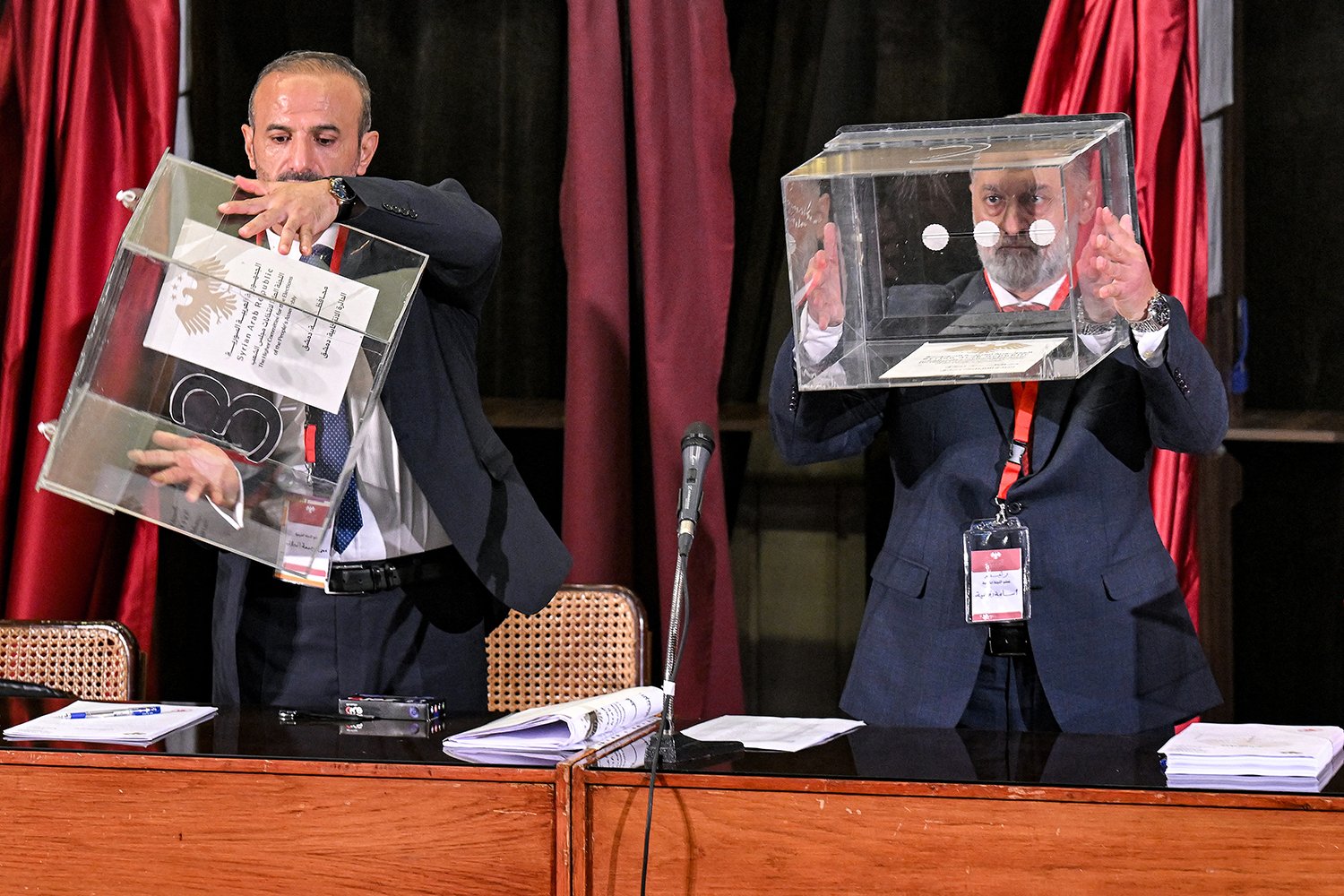Top Stories
Syria’s First Parliamentary Elections Under Sharaa: Urgent Insights

UPDATE: Syria has just concluded its first parliamentary elections since Ahmed al-Sharaa took power, with results raising serious concerns about the legitimacy of the electoral process. Held on October 5, 2025, the elections aimed to establish a new legislative body amid ongoing fears of authoritarian continuity under Sharaa’s transitional government.
Only a few thousand Syrians participated through a controversial electoral college system, which has been criticized for its lack of transparency and democratic integrity. Approximately 6,000 delegates were appointed to fill 119 of the 210 seats in a parliament that many believe will struggle to challenge Sharaa’s authority.
Adham Masoud al-Qaq, a key opposition figure who spent 36 years in exile, returned to Syria after the regime’s collapse on December 8, 2024. He was nominated as a delegate in the Damascus suburb of Jaramana. In an interview, Qaq expressed his disappointment with the election process, stating, “We could clearly sense that this or that person would win as a representative before the voting even took place.”
In March, Sharaa announced a five-year transitional period, during which these elections were held. While the governing assembly was granted some legislative powers, experts warn that these are merely procedural and heavily influenced by executive decisions. Radwan Ziadeh, a senior fellow at the Arab Center Washington DC, described the elections as “more the formation of Syrian legislative power” rather than a genuine democratic process.
Despite the overwhelming skepticism surrounding the elections, some candidates displayed an unexpected enthusiasm for political engagement. Reports from Foreign Policy revealed a mix of constructive debate and civic participation among those who managed to navigate the restrictive electoral framework.
The Higher Election Committee, appointed by Sharaa, orchestrated the elections through a tiered system in which local subcommittees held significant control over candidate selection. This opaque process has led to widespread allegations of corruption and manipulation. Many Syrians were reportedly unaware that elections were even taking place, as the political environment remains restrictive.
The elections also faced challenges, with several constituencies postponed indefinitely due to security concerns. Sharaa has yet to finalize the appointments for 70 seats that were supposed to be directly selected by him, possibly due to his busy schedule with international engagements, including meetings with Vladimir Putin and Donald Trump.
Candidates like Mouyad Zaidan, who faced threats and violence while campaigning, highlight the ongoing dangers in Syria’s political landscape. Zaidan noted the persistent influence of remnants from the Assad regime, stating, “The same criminals who committed atrocities are now scattered among us, engaging in theft, fraud, kidnapping, and murder.”
Only a small fraction of the elected delegates represent women and minorities, as the majority of seats went to Sunni men from the business elite. Of the 119 seats filled, only six were won by women, and only 10 by minority candidates, raising serious questions about inclusivity in Syria’s new governance structure.
As the dust settles on this historic election, the international community watches closely to see if Sharaa’s government can transition from a legacy of oppression to a more inclusive political system. The urgency of this moment cannot be understated, as the future of Syrian governance hangs in the balance.
For now, political observers remain cautious, urging the need for genuine reform as Syria attempts to emerge from decades of authoritarian rule. As the global audience turns its gaze to Syria, the crucial question remains: Will this new parliament serve as a true representative body, or will it merely perpetuate the status quo?
-

 Science4 weeks ago
Science4 weeks agoIROS 2025 to Showcase Cutting-Edge Robotics Innovations in China
-

 Politics4 weeks ago
Politics4 weeks agoJudge Considers Dismissal of Chelsea Housing Case Citing AI Flaws
-

 Lifestyle4 weeks ago
Lifestyle4 weeks agoStone Island’s Logo Worn by Extremists Sparks Brand Dilemma
-

 World4 weeks ago
World4 weeks agoBravo Company Veterans Honored with Bronze Medals After 56 Years
-

 Health4 weeks ago
Health4 weeks agoStartup Liberate Bio Secures $31 Million for Next-Gen Therapies
-

 Science4 weeks ago
Science4 weeks agoArizona State University Transforms Programming Education Approach
-

 Lifestyle4 weeks ago
Lifestyle4 weeks agoMary Morgan Jackson Crowned Little Miss National Peanut Festival 2025
-

 Health4 weeks ago
Health4 weeks agoTop Hyaluronic Acid Serums for Radiant Skin in 2025
-

 Top Stories4 weeks ago
Top Stories4 weeks agoIndonesia Suspends 27,000 Bank Accounts in Online Gambling Crackdown
-

 Sports4 weeks ago
Sports4 weeks agoMel Kiper Jr. Reveals Top 25 Prospects for 2026 NFL Draft
-

 Top Stories3 weeks ago
Top Stories3 weeks agoUrgent Weather Update: Chicago Forecast for October 20 Revealed
-

 World4 weeks ago
World4 weeks agoHoneywell Predicts Record Demand for Business Jets Over Next Decade









